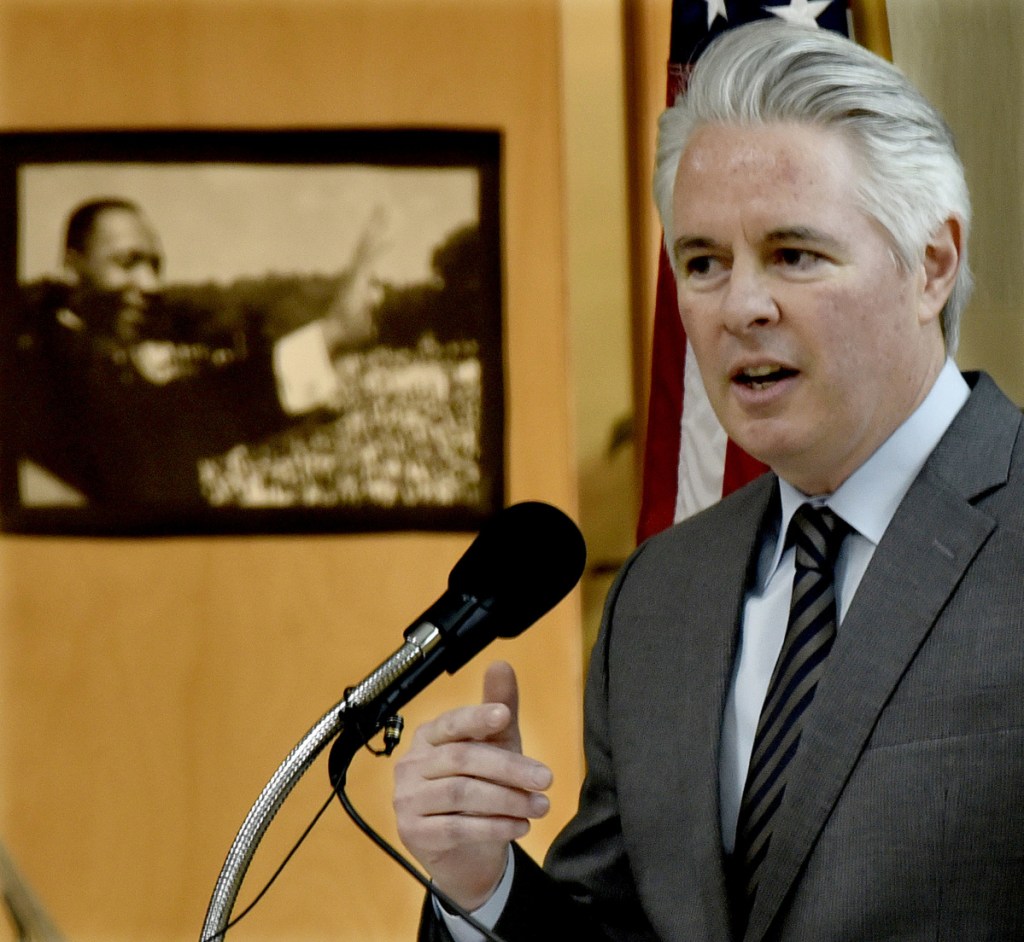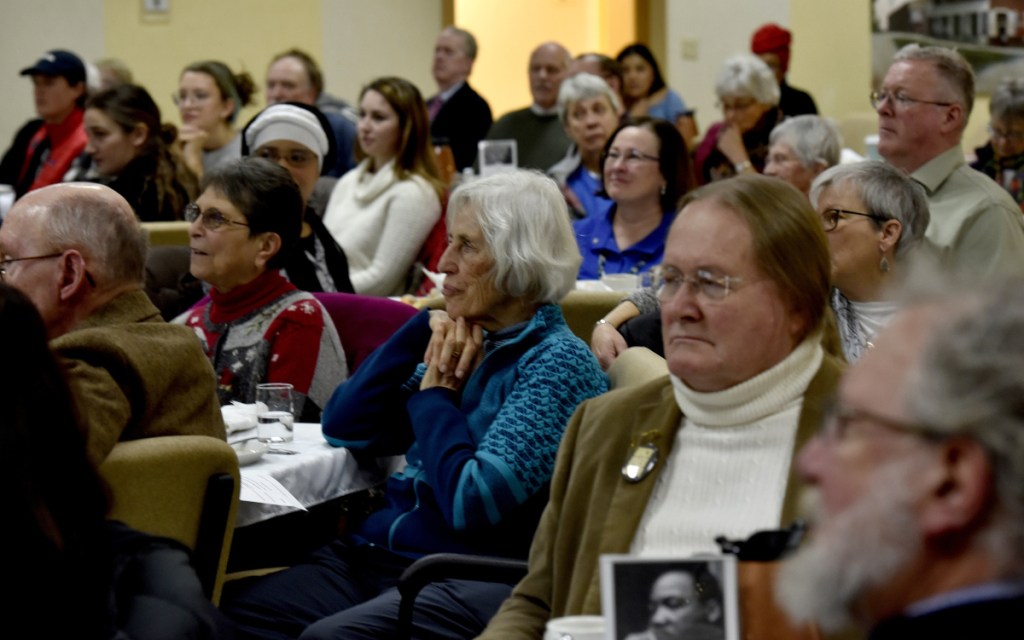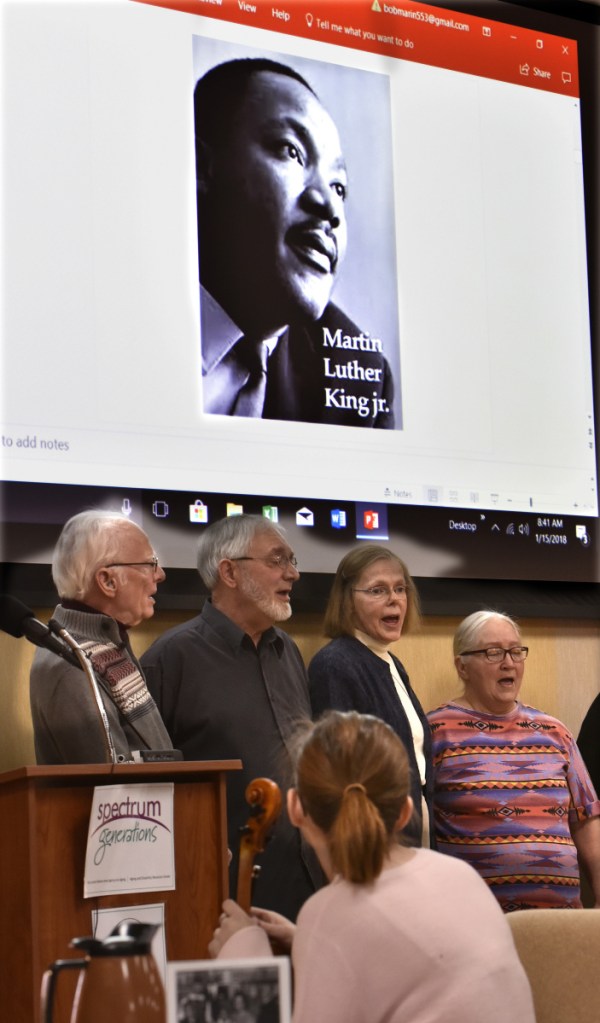WATERVILLE — Half a century after Martin Luther King Jr. was assassinated in Memphis, the slain civil rights leader’s contention that the “plant of freedom has grown only a bud and not yet a flower” still applies, Colby College President David A. Greene says.
“He noted that the critical work is hardly done,” Greene said. “It is still hardly done.”
Speaking Monday morning to about 130 people who turned out for the 32nd annual Martin Luther King Jr. Day Community Breakfast at Spectrum Generations Muskie Center, Greene said problems continue to exist.
Now, as 50 years ago, African-Americans are twice as likely to be unemployed as whites and with half the income in places such as Chicago, Greene’s former home, he said. Greene also cited the violence that occurs in Chicago, where 17 people were shot over the weekend and 650 people were murdered last year, according to media reports. Those numbers dwarf the fatalities of U.S. soldiers serving in Iraq (15) and Afghanistan (17) last year, according to icasualties.org. While noting that all deaths from violence are senseless, Greene questioned why it is we barely notice the daily toll violence takes on Chicago.
“Is it because four out of five victims in Chicago are African-American?” he asked.
The Chicago victims had been living in despair with a lack of health and social services and no economic hope, Greene said.
“Throw-away people — that’s the way we treat them,” he said.
Greene recalled reading a story on the front page of the New York Times about a wealthy suburban family killed in a plane crash and asking himself why it is not front-page news when thousands are killed in the cities.
“It pushed me to think about how we value and devalue lives in our daily actions,” he said.
Greene’s view is that no person who values human life, no person with an ounce of compassion, would argue with the phrase “all lives matter” — that the value of African-American lives is equal to the lives of all others, he said. Yet the evidence shows that, as a society, we do not value all lives equally, according to Greene.
“If we did, would we look away from the shootings in Chicago?” he asked.
Monday’s King breakfast, co-sponsored by the Waterville Rotary Club and Spectrum Generations, drew people from all walks of life, including politicians, teachers, pastors, city officials, hospital administrators, retired people and schoolchildren.
Greene reflected on the tone of the country 50 years ago, when King, 39, was killed. There was a deep distrust of American institutions and power structures, people were being killed in Vietnam, demonstrations were held and riots were breaking out.
King asked people to tear down the walls that separate them, including those separating the inner city of poverty and despair, according to Greene, who contends those walls still continue today in places such as Chicago — and even Waterville.
“I want us to ask ourselves this morning, who else do we overlook in our everyday actions?” he said, wondering aloud. “Is it the poor among us?”
Sixty percent of Waterville school children are eligible for free or reduced lunches and the mean income in the city is $34,400 — below the state’s mean, he said. The homeless shelter in Waterville is full, and places such as the Waterville Food Bank, Alfond Youth Center, Kennebec Valley Community Action Program and South End Teen Center are heavily used.
“These organizations deserve our admiration and our support,” he said. “They make such a difference in this city for the lives of many.”
The Waterville Police Department’s Operation Hope Program, which helps place people addicted to opioids in treatment centers, deserves support, as do efforts to support those in the LGBTQ community who face threats of violence and hate, Greene said. People must do more than just post anti-racist sentiments on Facebook pages — they must stop pitting groups against each other and become more open and welcoming.
When a controversy erupted last year over funding for public schools, it was “not our finest moment,” as there was name-calling and mean-spiritedness, with people questioning others’ motives, Greene said.
Equal access to quality education is critical to ensure higher wages and quality of life — and it levels the playing field for all young people, according to Greene.
“The evidence is overwhelming that investment in education pays off tenfold,” he said. “This is not something we should be arguing about. It is not a political issue.”
Greene, who attended the breakfast with his wife, Carolyn, received a standing ovation for his speech.
“It was very inspiring — it was very powerful,” said Phil Bofia, a Waterville resident who was sitting at a table in the front row.
Bofia said Greene’s speech spoke not only to the past, but also to what is happening today in the country and in Waterville. Today, we should challenge ourselves to see how we can be part of the solution and not part of the problem, according to Bofia.
“This should be a time to really look back and reflect and really live by the words Martin Luther King spoke 50 years ago,” he said. “Like Dr. Greene said, they were relevant then, and today those works will still resonate and have the same healing as 50 years ago.”
Rotary President Buffy Higgins was master of ceremonies and Richard Dorian, a pastor and executive director of the Maine Children’s Home for Little Wanderers, gave the invocation. The Rev. Alice Anderman gave the benediction. Violinists Peter Garrett and Pyper Birch played violin as the crowd sang “Let There be Peace on Earth,” and the Tourmaline Singers, under the director of Harry Vayo, performed.
Amy Calder — 861-9247
Twitter: @AmyCalder17
Send questions/comments to the editors.







Success. Please wait for the page to reload. If the page does not reload within 5 seconds, please refresh the page.
Enter your email and password to access comments.
Hi, to comment on stories you must . This profile is in addition to your subscription and website login.
Already have a commenting profile? .
Invalid username/password.
Please check your email to confirm and complete your registration.
Only subscribers are eligible to post comments. Please subscribe or login first for digital access. Here’s why.
Use the form below to reset your password. When you've submitted your account email, we will send an email with a reset code.